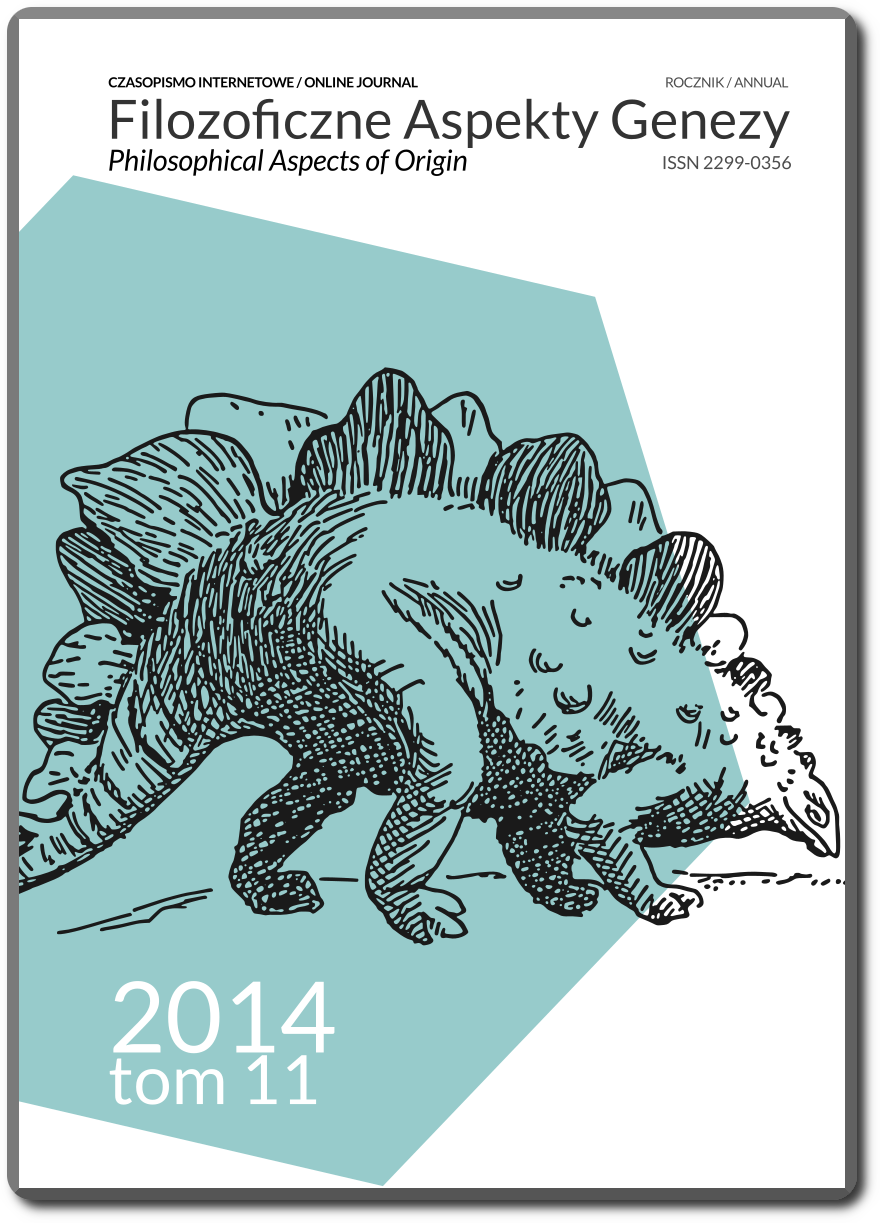Opublikowane 21.05.2021
Słowa kluczowe
- naturalizm metodologiczny,
- naturalizm metafizyczny,
- teizm chrześcijański,
- religijna nieneutralność nauki,
- teologia Boga w lukach wiedzy
- nauka duhemowska,
- nauka augustiańska ...More

Utwór dostępny jest na licencji Creative Commons Uznanie autorstwa 4.0 Międzynarodowe.
Jak cytować
Abstrakt
W ramach filozoficznej doktryny naturalizmu metodologicznego utrzymuje się, że warunkiem uznania jakiegokolwiek badania świata za „naukowe” jest to, że nie może ono odwoływać się do stwórczego działania Boga (ani żadnego innego rodzaju działalności Bożej). Twierdzi się, że metody nauki „nie dają żadnego punktu oparcia” dla sądów teologii — nawet jeśli te ostatnie są prawdziwe — i dlatego teologia nie może wpływać na wyjaśnienia naukowe lub uzasadnianie teorii. Mówi się zatem, że nauka ma być religijnie neutralna, choćby dlatego, że nauka i religia z samej swej natury są odrębne pod względem epistemicznym. Jednakże rzeczywista praktyka i treść nauki podważa to twierdzenie. W wielu dziedzinach nauka bynajmniej nie jest religijnie neutralna. Co więcej, argumenty zazwyczaj przytaczane na rzecz naturalizmu metodologicznego obarczone są rozmaitymi poważnymi wadami. Filozoficzna doktryna naturalizmu metodologicznego jest wadliwa. Ponadto ani twierdzenia dotyczące definicji lub zasadniczej natury nauki, ani teologiczne presupozycje (na przykład „funkcjonalna integralność”) nie mogą udzielić należytego poparcia naturalizmowi metodologicznemu. Można jednak znaleźć mocniejsze poparcie dla tej doktryny w ramach tego, co można nazwać „nauką duhemowską” — to znaczy takich badań empirycznych, które na wspólnej płaszczyźnie uprawiają wszystkie frakcje, niezależnie od jakichkolwiek założeń metafizycznych, jakie mogą utrzymywać tylko niektórzy badacze. Nauka duhemowska jest zatem „maksymalnie globalna”. „Nauka augustiańska” zaś może posługiwać się konkretnymi założeniami teologicznymi lub filozoficznymi. Ideał nauki duhemowskiej nie powinien wykluczać nauki augustiańskiej: obie stanowią zasadne formy badań.
Downloads
Bibliografia
- Willey Basil, „Darwin’s Place in the History of Thought”, w: Michael Banton (ed.), Darwinism and the Study of Society: A Centenary Symposium, Quadrangle Books, Chicago 1961, s. 1-16.
- McMullin Ernan, „Plantinga’s Defense of Special Creation”, Christian Scholar’s Review 1991, vol. 21, no. 1, s. 55-79.
- Plantinga Alvin, „When Faith and Reason Clash: Evolution and the Bible”, Christian Scholar’s Review 1991, vol. 21, no. 1, s. 8-33.
- Plantinga Alvin, „Evolution, Neutrality, and Antecedent Probability: A Reply to Pun, Van Till and McMullin”, Christian Scholar’s Review 1991, vol. 21, no. 1, s. 80-109.
- Plantinga Alvin, The Twin Pillars of Christian Scholarship: The Henry Stob Lectures, Calvin College and Seminary, Grand Rapids 1989.
- Simon Herbert A., „A Mechanism for Social Selection and Successful Altruism”, Science 1990, vol. 250, no. 4988, s. 1665-1668.
- South Bend Tribune 21 December 1991; nagłówek Alexandria, Virginia.
- Pollock John L., „How to Build a Person: The Physical Basis for Mentality”, w: James E. Tomberlin (ed.), Philosophical Perspectives: Volume 1: Metaphysics, Ridgeview Publishing Company, Atascadero 1987, s. 109-154.
- Shapiro Robert, Origins: A Skeptic’s Guide to the Creation of Life on Earth, Summit Books, New York 1986.
- Thaxton Charles B., Bradley Walter L., and Olsen Roger L., The Mystery of Life’s Origin: Reassesing Current Theories, Philosophical Library, New York 1984.
- List Karola Darwina do Josepha Daltona Hookera z dnia 29 marca 1863 roku w: Francis Darwin (ed.), The Life and Letters of Charles Darwin, vol. 2, Appleton, New York 1967, s. 202.
- Wicken Jeffrey S., Evolution, Thermodynamics, and Information: Extending the Darwinian Program, Oxford University Press, New York 1987.
- Cairns-Smith Alexander Graham, Seven Clues to the Origin of Life: A Scientific Detective Story, Cambridge University Press, Cambridge 1985.
- Cairns-Smith Alexander Graham, Genetic Takeover and the Mineral Origins of Life, Cambridge University Press, Cambridge 1985.
- Dyson Freeman J., Początki życia, przeł. Paweł Golik, Biblioteka Myśli Współczesnej, Państwowy Instytut Wydawniczy, Warszawa 1993.
- Denton Michael, Evolution: A Theory in Crisis, Burnet Books, London 1985.
- Ayala Francisco J., „Theory of Evolution: Recent Successes and Challenges”, w: Ernan McMullin (ed.), Evolution and Creation, University of Notre Dame Press, Notre Dame 1985, s. 59-90.
- Gould Stephen J., „Ewolucja jako fakt i teoria”, w: Stephen J. Gould, Niewczesny pogrzeb Darwina. Wybór esejów, wyd. 2., przeł. Nina Kancewicz-Hoffman, Prószyński i S-ka, Warszawa 1999, s. 131-142.
- Dawkins Richard, Samolubny gen, przeł. Marek Skoneczny, Na Ścieżkach Nauki, Prószyński i S-ka, Warszawa 1996.
- Spieth Philip T., „Evolutionary Biology and the Study of Human Nature”, nieopublikowany artykuł, zaprezentowany na konferencji dotyczącej kosmologii i teologii, sponsorowanej przez Kościół Prezbiteriański w Stanach Zjednoczonych w grudniu 1987 roku.
- Ruse Michael, Darwinism Defended: A Guide to Evolution Controversies, Addison-Wesley, Reading, Massachusetts 1982.
- Gould Stephen J., „So Cleverly Kind of an Animal”, w: Stephen J. Gould, Ever Since Darwin: Reflections in Natural History, W.W. Norton & Company, New York — London 1977, s. 260-267.
- Gould Stephen J., „In Praise of Charles Darwin”, w: Charles L. Hamrum (ed.), Darwin’s Legacy: Nobel Conference XVIII, Harper & Row, San Francisco 1983, s. 6-7.
- Futuyma Douglas J., Evolutionary Biology, 2nd ed., Sinauer Associates, Sunderland 1986.
- Simpson George Gaylord, The Meaning of Evolution: A Study of the History of Life and its Significance for Man, rev. ed., Yale University Press, New Haven 1967.
- Dawkins Richard, Ślepy zegarmistrz, czyli jak ewolucja dowodzi, że świat nie został zaplanowany, przeł. Antoni Hoffman, Biblioteka Myśli Współczesnej, Państwowy Instytut Wydawniczy, Warszawa 1994.
- Carr Bernard J. and Rees Martin J., „The Anthropic Principle and the Structure of the Physical World”, Nature 1979, vol. 278, s. 605-612.
- Carter Brandon, „Large Number Coincidences and the Anthropic Principle in Cosmology”, w: Malcolm S. LONGAIR (ed.), Confrontation of Cosmological Theories with Observational Data, Reidel Publishing Company, Dodrecht — Boston 1974, s. 291-298.
- Hawking Stephen W., „The Anisotropy of the Universe at Large Times”, w: Malcolm S. LONGAIR (ed.), Confrontation of Cosmological Theories with Observational Data, Reidel Publishing Company, Dodrecht — Boston 1974, s. 283-286.
- Hawking Stephen W., „Wszechświat a człowiek”, przeł. Bolesław Rok, w: Michał HEMPOLIŃSKI (red.), Ontologia. Antologia tekstów filozoficznych, Ossolineum, Wrocław — Warszawa — Kraków 1994, s. 399-401.
- Polkinghorne John C., Nauka i Stworzenie. Poszukiwanie zrozumienia, przeł. Marek Chojnacki, Wiara i Nauka, Wydawnictwo WAM, Kraków 2008.
- Davies Paul, The Accidental Universe, Cambridge University Press, Cambridge 1991.
- Racięski Jarosław i Kabiesz Edward (red.), Encyklopedia Dzikiego Zachodu, Videograf II, Katowice 1996.
- Gardner Martin, „WAP, SAP, PAP and FAP”, New York Review of Books 8 May 1987, no. 33, s. 22-25.
- Collins C.B. and Hawking Stephen W., „Why is the Universe Isotropic?”, The Astrophysical Journal 1973, vol. 180, no. 2, s. 317-334.
- Earman John, „The Sap Also Rises: A Critical Examination of the Anthropic Principle”, American Philosophical Quarterly 1987, vol. 24, no. 4, s. 307-317.
- Lewis David K., On the Plurality of Worlds, Basil Blackwell Limited, Oxford 1986.
- McMullin Ernan, „Fine-tuning the Universe?”, w: Mark H. SHALE and George W. SHIELDS (eds.), Science, Technology, and Religious Ideas, University Press of America, Lanham 1994, s. 97-125.
- Guth Alan H., „Inflationary Universes: A Possible Solution to the Horizon and Flatness Problems”, Physical Review D 1981, vol. 23, no. 2, s. 347-356.
- Linde Andrei D., „The Inflationary Universe”, Reports on Progress in Physics 1984, vol. 47, no. 8, s. 925-986.
- Linde Andrei D., „Particle Physics and Inflationary Cosmology”, Physics Today 1987, vol. 40, no. 9 s. 61-68.
- Van Fraassen Bas, Quantum Mechanics: An Empiricst View, Clarendon Press, Oxford 1991.
- Hasker William, „Evolution and Alvin Plantinga”, Perspectives on Science and Christian Faith 1992, vol. 44, no. 3, s. 150-162.
- Plantinga Alvin, „Reason and Belief in God”, w: Alvin Plantinga and Nicholas Wolterstorff (eds.), Faith and Rationality: Reason and Belief in God, University of Notre Dame Press, Notre Dame, Indianapolis 1983, s. 16-93.
- Laudan Larry, „Zgon problemu demarkacji”, przeł. Artur Koterski, w: Zbysław Muszyński (red.), Z badań nad prawdą, nauką i poznaniem, Realizm. Racjonalność. Relatywizm, t. 31, Wydawnictwo UMCS, Lublin 1998, s. 63-79.
- Van Fraassen Bas, Laws and Symmetry, Oxford University Press, Oxford 1989.
- Armstrong David M., What is a Law of Nature?, Cambridge Studies in Philosophy, Cambridge University Press, Cambridge 1983.
- Davis Marc, „Cosmology: The Modern Creation Myth”, Bulletin of the American Academy of the Arts and Sciences 1992, vol. 45, no. 8, s. 47-64.
- Van Till Howard J., „When Faith and Reason Cooperate”, Christian Scholar’s Review 1991, vol. 21, no. 1, s. 33-45.
- Alston William P., „Divine and Human Action”, w: Thomas V. MORRIS (ed.), Divine and Human Action: Essays in Metaphysics of Theism, Cornell University Press, Ithaca 1988.
- Allen Diogenes, Christian Belief in a Postmodern World: The Full Wealth of Conviction, Westminster/John Knox Press, Louisville 1989.
- Stek John H., „What Says the Scripture?”, w: Howard J. Van Till, Robert E. Snow, John H. Stek, and Davis A. Young (eds.), Portraits of Creation: Biblical and Scientific Perspectives on the World’s Formation, William B. Eerdmans Publishing Company, Grand Rapids 1990, s. 203-265.
- Plantinga Alvin, „Is Theism Really a Miracle?”, Faith and Philosophy 1986, vol. 3, no. 2, s. 109-134.
- Duhem Pierre M., The Aim and Structure of Physical Theory, trans. Philip P. Wiener, Princeton University Press, Princeton 1954.
- Rey Abel, „La Philosophie Scientifique de M. Duhem”, Revue de Métaphysique et de Morale 1904, t. 12, no. 4, s. 699-744.
- Duhem Pierre, „Fizyka wierzącego”, przeł. Monika Sakowska, w: Krzysztof Szlachcic (red.), Pierre Duhema filozofia nauki. Wybór pism, Wydawnictwo Uniwersytetu Wrocławskiego, Wrocław 1991, s. 51-72.
- Szlachcic Krzysztof, Filozofia nauk empirycznych Pierre’a Duhema, Wydawnictwo Uniwersytetu Wrocławskiego, Wrocław 2011.
- Duhem Pierre M., „Physics of a Believer”, w: Pierre M. Duhem, The Aim and Structure of Physical Theory, trans. Philip P. Wiener, Princeton University Press, Princeton 1954, s. 273-311.
- Duhem Pierre, „Teoria fizyczna a wyjaśnianie metafizyczne”, przeł. Monika Sakowska, w: Krzysztof Szlachcic (red.), Pierre Duhema filozofia nauki. Wybór pism, Wydawnictwo Uniwersytetu Wrocławskiego, Wrocław 1991, s. 32-36.
- List Christiaana Huygensa do Georga W. Leibniza z dnia 18 listopada 1690 roku, w: Johannes Bosscha Jr. (ed.), Oeuvres Complètes de Christiaan Huygens, Correspondence 1685-1690, t. 9, Martinus Nijhoff, Den Haag 1901, list 2633, s. 536-540.
- Roberval Gilles, Aristarchi Samii, De mundi systemate, patribus et motibus ejusdem, liber singularis, książka niewydana drukiem, Paris 1643.
- List Kartezjusza do Mersenne’a z dnia 20 kwietnia 1646 roku, w: Paul Tannery et Charles Adam (éd.), Oeuvres de Descartes, Correspondence Juillet 1643 — Avril 1647, t. 4, Léopold Cerf, Paris 1901, list CDXXX, s. 396-403.
- Duhem Pierre, „Teoria fizyczna i klasyfikacja naturalna”, przeł. Monika Sakowska, w: Krzysztof Szlachcic (red.), Pierre Duhema filozofia nauki. Wybór pism, Wydawnictwo Uniwersytetu Wrocławskiego, Wrocław 1991, s. 36-44.
- Arystoteles, Analityki pierwsze i wtóre, przeł. Kazimierz Leśniak, Biblioteka Klasyków Filozofii, PWN, Warszawa 1973.



